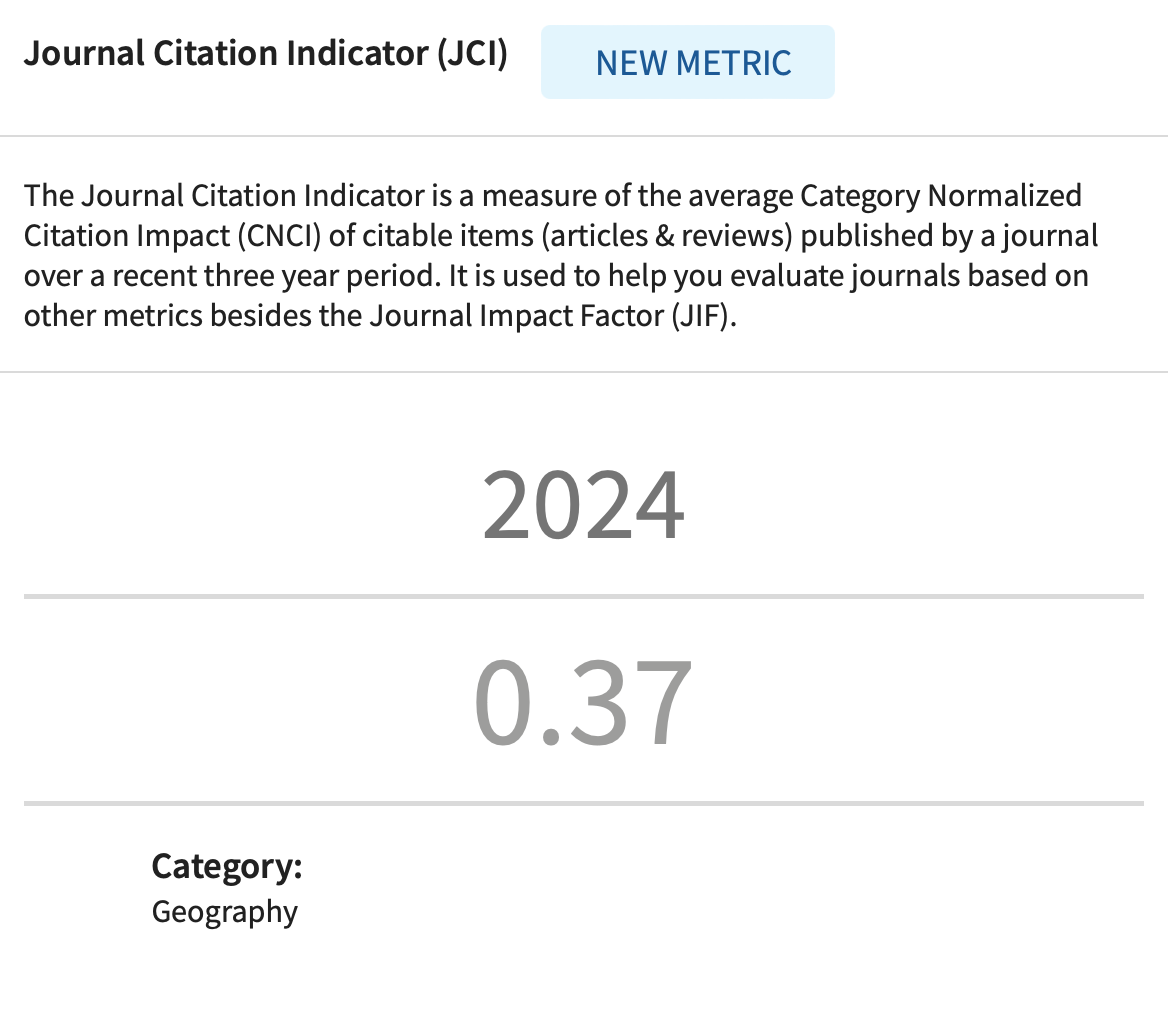DEBRIS FLOWS IN KRESNA GORGE (BULGARIA)—GEOMORPHOLOGICAL CHARACTERISTICS AND WEATHER CONDITIONS
DOI:
https://doi.org/10.2298/IJGI2101015KKeywords:
debris flows, geomorphological features, synoptic situations, rainfallAbstract
Over the last decades, numerous extreme climate events such as extreme temperatures, droughts, heavy precipitation, and storms associated with climate change have been recorded in many countries, including Bulgaria. As a result, geomorphological hazards such as landslides, debris flows, mudflows, high-speed soil erosion, etc. often occur on the territory of the country. The debris flow is one of the most common hazardous processes in small catchments of the main river basins in Bulgaria. The Kresna Gorge located in the middle part of Struma River valley is a typical area with such processes which often cause the damages to the E79 international highway. The purpose of the present study is to characterize debris flows in Kresna Gorge (southwestern part of Bulgaria) by comparative analysis between the two events (occurred on May 24, 2009 and July 28, 2019). In order to achieve the aim of the study the geomorphological features and flow type of 2019 event were identified and the results were compared with the previous publications which investigated the event on May 24, 2009. In the present paper, the sediments and the type of transportation of the investigated event (July 2019) were determined by grain-size and clast-shape analysis. The impact of weather conditions on debris flow occurrence was shown by the analysis of the synoptic conditions on the day before the event. The results of the study bring to clarifying the geological-geomorphological and meteorological factors for the occurrence of debris flow and are important for geomorphological hazard management.
Article metrics
References
Brouchev, I., Frangov, G., Varbanov, R., & Ivanov, P. (2001). Geological Hazards in the Western Periphery of the Rhodope Region. Geologica Balcanica, 31(1–2), 67–79. Retrieved from https://www.geologica-balcanica.eu/sites/default/files/articles/GB%282001%29_31_1-2_pp.67-79%20%28Brouchev%20et%20al%29.pdf
Dobrev, N., & Georgieva, M. (2010). Kalno-kamennite poroi v severnata chast na Kresnenskoto defile: harakteristika na zonata na podhranvane i svoystva izgrazhdashte ya materiali [The debris flow in the northern part of Kresna Gorge: Characterization of the source zone and material properties]. Review of the Bulgarian Geological Society, 71(1–3), 113–121. Retrieved from http://bgd.bg/REVIEW_BGS/REVIEW_BGD_2010/PDF/08_Dobrev_BGD_Review_2010.pdf
European Centre for Medium-Range Weather Forecasts. (2011-present). The ERA-Interim archive (Version 2.0) [Data set]. Retrieved March 11, 2021, from https://www.ecmwf.int/node/8174
Gerdjikov, I., Vangelov, D., & Glabadanidu, I. (2012). Edin podtsenen geolozhki risk: debritnite pototsi [One underestimated geological hazard: the debris flows]. Review of the Bulgarian Geological Society, 73(1–3), 85–104. Retrieved from http://bgd.bg/REVIEW_BGS/REVIEW_BGD_2012/PDF/05_Gerdjikov_BGS_Rev_2012.pdf
Godev, N., (1976). Sinoptichna meteorologia [Synoptic meteorology]. Sofia, Bulgaria: Nauka i izkustvo.
Jomelli, V., Brunstein, D., Déqué, M., Vrac, M., & Grancher, D. (2009). Impacts of future climatic change (2070–2099) on the potential occurrence of debris flows: a case study in the Massif des Ecrins (French Alps). Climatic Change, 97(1), 171–191. https://doi.org/10.1007/s10584-009-9616-0
Jomelli, V., Pavlova, I., Giacona, F., Zgheib, T., & Eckert, N. (2019). Respective influence of geomorphologic and climate conditions on debris-flow occurrence in the Northern French Alps. Landslides, 16(10), 1871–1883. https://doi.org/10.1007/s10346-019-01195-7
Kenderova, R., & Baltakova, A. (2013). Debris Flows in Kazanlak Valley, South Slopes of the Balkan Mountain Range, Bulgaria. Journal of the Geographical Institute “Jovan Cvijić” SASA, 63(3 Conference Issue), 361–370. https://doi.org/10.2298/IJGI1303361K
Kenderova, R., Baltakova, A., & Ratchev, G. (2013). Debris Flows in the Middle Struma Valley, Southwest Bulgaria. In D. Lóczy (Ed.), Geomorphological Impacts of Extreme Weather: Case Studies from Central and Eastern Europe (pp. 281–297). https://doi.org/10.1007/978-94-007-6301-2_18
Kenderova, R., Ratchev, G., & Baltakova, A. (2013). Formirane i proiava na selevi potoci v dolinata na Sredna Struma (3–5 dekenvri 2010) [Forming and activity of debris flow in Middle Struma Valley (3–5 December 2010)]. Godišnik na Sofijskiâ universitet "Sv. Kliment Ohridski". Geologo-geografski fakultet. Kniga 2 – Geografiâ, 105, 15–32. Retrieved from http://digilib.nalis.bg/xmlui/handle/nls/166?locale-attribute=en
Kenderova, R, Rachev, G., & Baltakova, A. (2014). Seli v dolinata na Sredna Struma [Debris Flow in Middle Struma Valley]. Godišnik na Sofijskiâ universitet "Sv. Kliment Ohridski". Geologo-geografski fakultet. Kniga 2 – Geografiâ, 106, 13–40. Retrieved from http://digilib.nalis.bg/xmlui/handle/nls/166?locale-attribute=en
Kononova, N., & Malneva, I. (2012). Debris Flow and Landslide Hazards Under Certain Types of Atmospheric Circulation. Geography, Environment, Sustainability, 5(2), 68–77. https://doi.org/10.24057/2071-9388-2012-5-2-68-77
Marinova, R., & Zagorchev, I. (1990). Geoložka karta na Bǎlgarija (1:100 000), Listy K-34-083 (Razlog) [Geological map of the Republic of Bulgaria (1:100 000), Map sheet K-34-083 (Razlog)]. Sofia, Bulgaria: Department of Geophysical Prospecting and Geological Mapping.
Ministry of Regional Development and Public Works of Republic of Bulgaria. (2010). GIS of the Ministry of Regional Development and Public Works [Geoportal]. Retrieved from http://gis.mrrb.government.bg/
Munsell Color (Firm). (2010). Munsell soil color charts: with genuine Munsell color chips. Grand Rapids, MI: Munsell Color.
National Centers for Environmental Prediction/National Weather Service/NOAA/U.S. Department of Commerce. (1994-present). NCEP/NCAR Global Reanalysis Products, 1948-continuing [Data set]. Retrieved March 11, 2021, from https://psl.noaa.gov/data/gridded/data.ncep.reanalysis.html
Nikolova, V., Kamburov, A., & Rizova, R. (2020). Morphometric analysis of debris flows basins in the Eastern Rhodopes (Bulgaria) using geospatial technologies. Natural Hazards, 105(1), 159–175. https://doi.org/10.1007/s11069-020-04301-4
Nikolova, N., Rachev, G., & Kenderova, R. (2018). Possible impact of climate and weather conditions on debris flows occurrence (on the example of Kresna Gorge, Bulgaria). In S. S. Chernomorets & G. V. Gavardashvili (Eds.), DEBRIS FLOWS: Disasters, Risk, Forecast, Protection. Proceedings of the 5th International Conference. Tbilisi, Georgia, 1-5 October, 2018. (pp. 166–175). Retrieved from http://www.debrisflow.ru/wp-content/uploads/2018/10/Nikolova_DF18.pdf
Nikolova, V., Zlateva, P., Berov, B., Kamburov, A., & Velev, D. (2020). Conceptual Model of Debris Flow Information System. In Y. Murayama, D. Velev, & P. Zlateva (Series Eds.), IFIP Advances in Information and Communication Technology: Vol. 575. Information Technology in Disaster Risk Reduction (pp. 146–158). https://doi.org/10.1007/978-3-030-48939-7_13
Pavlova, I., Jomelli, V., Brunstein, D., Grancher, D., Martin, E., & Déqué, M. (2014). Debris flow activity related to recent climate conditions in the French Alps: A regional investigation. Geomorphology, 219, 248–259. https://doi.org/10.1016/j.geomorph.2014.04.025
Pettijohn, F. J., Potter, P. E., & Siever. R. (1972). Sand and Sandstone. https://doi.org/10.1007/978-1-4615-9974-6
Pettijohn, F. J., Potter, P. E., & Siever. R. (1987). Sand and Sandstone (2nd ed.). https://doi.org/10.1007/978-1-4612-1066-5
Popsavov, R. (2005, May 18–19). Pochvenata erozia I gorskia fond: sastoianie I merki za ogranichavane [Soil erosion in the forest fund: state and measures for limitation]. Scientific-practical conference “100 godini organizirana borba s erpziata v Balgaria” [100 years of organized erosion control in Bulgaria], Kardzhali, Bulgaria. Retrieved from http://www.gorabg-magazine.info/old/eroz_07_05.html
Savi, S., Schildgen, T. F., Tofelde, S., Wittmann, H., Scherler, D., Mey, J., Alonso, R. N., & Strecker, M. R. (2016). Climatic controls on debris-flow activity and sediment aggradation: The Del Medio fan, NW Argentina. Journal of Geophysical Research: Earth Surface, 121, 2424–2445. https://doi.org/10.1002/2016JF003912
Serebrianniy, L. R. (1980). Laboratornii analiz v geomorfologi i chetvertichnoi paleogeografii [Laboratory analysis in geomorphology and quaternary paleogeography]. Moscow, Russia: Viniti.
Rebetez, M., Lugon, R., & Baeriswyl, P.-A. (1997). Climatic Change and Debris Flows in High Mountain Regions: The Case Study of the Ritigraben Torrent (Swiss Alps). In H. F. Diaz, M. Beniston, & R. S. Bradley (Eds.), Climatic Change at High Elevation Sites (pp. 139–157). https://doi.org/10.1007/978-94-015-8905-5_8
Topliiski, D. (2006). Klimat na Balgaria [Climate of Bulgaria]. Sofia, Bulgaria: Amstels Foundation.
Turkington, T., Remaître, A., Ettema, J., Hussin, H., & van Westen, C. (2016). Assessing debris flow activity in a changing climate. Climatic Change, 137(1), 293–305. https://doi.org/10.1007/s10584-016-1657-6
U.S. Geological Survey, Earth Resources Observation and Science Center. (2014). SRTM 1 Arc-Second Global [data set]. https://doi.org/10.5066/F7PR7TFT
Vasilev, I., & Kenderova, R. (2002). Klimatichnite promeni v Balgaria – prichina za aktivizirane na selevite potoci [Climate change in Bulgaria – cause for activation of mudflows]. Problems of Geography, 1–4, 75–81.
Winter, M. G., Dent, J., Macgregor, F., Dempsey, P., Motion, A., & Shackman, L. (2010). Debris flow, rainfall and climate change in Scotland. Quarterly Journal of Engineering Geology and Hydrogeology, 43(4), 429–446. https://doi.org/10.1144/1470-9236/08-108
Downloads
Published
How to Cite
Issue
Section
License
Copyright (c) 2021 Journal of the Geographical Institute “Jovan Cvijić” SASA

This work is licensed under a Creative Commons Attribution-NonCommercial-NoDerivatives 4.0 International License.











